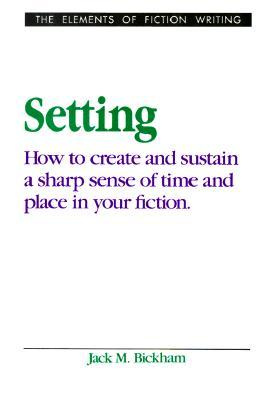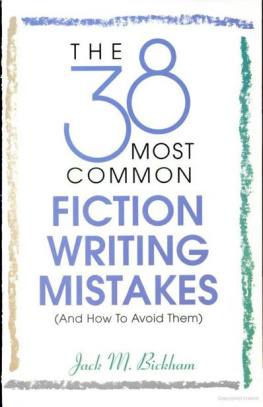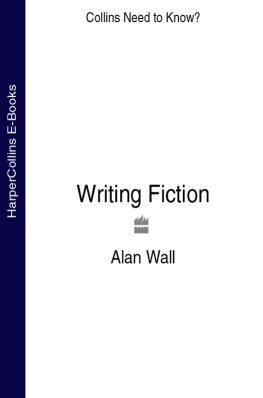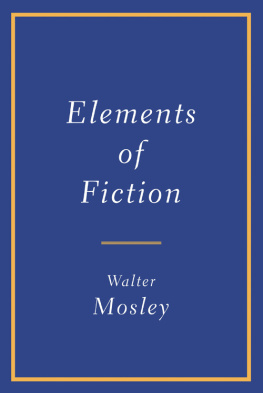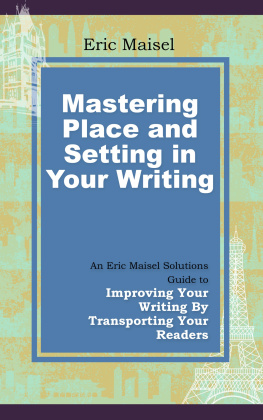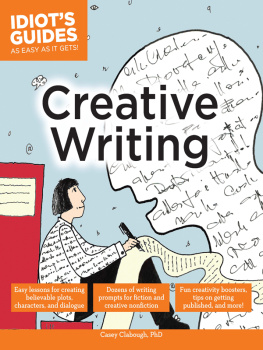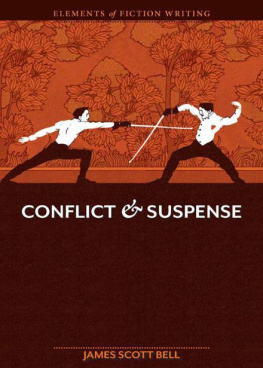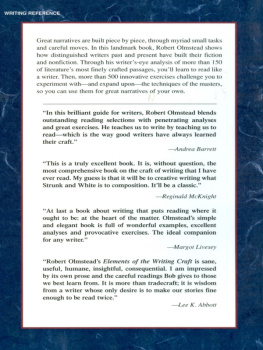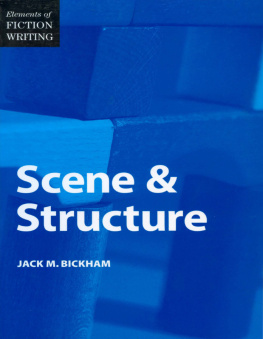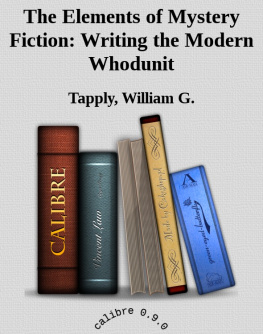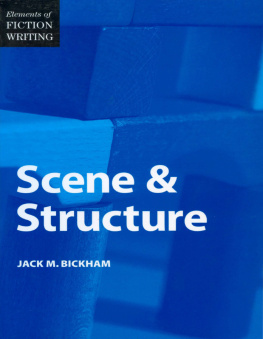Jack M. Bickham - Setting (Elements of Fiction Writing)
Here you can read online Jack M. Bickham - Setting (Elements of Fiction Writing) full text of the book (entire story) in english for free. Download pdf and epub, get meaning, cover and reviews about this ebook. year: 1999, publisher: Writers Digest Books, genre: Art. Description of the work, (preface) as well as reviews are available. Best literature library LitArk.com created for fans of good reading and offers a wide selection of genres:
Romance novel
Science fiction
Adventure
Detective
Science
History
Home and family
Prose
Art
Politics
Computer
Non-fiction
Religion
Business
Children
Humor
Choose a favorite category and find really read worthwhile books. Enjoy immersion in the world of imagination, feel the emotions of the characters or learn something new for yourself, make an fascinating discovery.
- Book:Setting (Elements of Fiction Writing)
- Author:
- Publisher:Writers Digest Books
- Genre:
- Year:1999
- Rating:4 / 5
- Favourites:Add to favourites
- Your mark:
- 80
- 1
- 2
- 3
- 4
- 5
Setting (Elements of Fiction Writing): summary, description and annotation
We offer to read an annotation, description, summary or preface (depends on what the author of the book "Setting (Elements of Fiction Writing)" wrote himself). If you haven't found the necessary information about the book — write in the comments, we will try to find it.
Setting (Elements of Fiction Writing) — read online for free the complete book (whole text) full work
Below is the text of the book, divided by pages. System saving the place of the last page read, allows you to conveniently read the book "Setting (Elements of Fiction Writing)" online for free, without having to search again every time where you left off. Put a bookmark, and you can go to the page where you finished reading at any time.
Font size:
Interval:
Bookmark:


CHAPTER 1
WHY SETTING IS IMPORTANT
Setting is a topic seldom discussed at length in writers' workshops or addressed in any detail in texts for creators of fiction. Like the weather, it's mentioned in conversations, but considered entirely out of our control. Yet setting is a vital component of any story, and it does involve a body of technique which you can learn and use to improve your creative work.
Story setting is even defined too narrowly in those few texts which do consider it. It is not merely the physical backdrop of the tale. It may also include the historical background and cultural attitudes of a given place and time, the mood of a time, and how the story people talk. Also tied closely to setting may be such details as the author's style, a period's traditions, and the kind of story the writer wishes to relate.
All of these factors must dovetail properly with the story's plot, its characters, the theme and the desired general emotional tone of the piece if the finished fiction is to "work" for the reader.
Many classic tales are classics precisely because all these factors fit together perfectly. Most can scarcely be imagined in a different setting. Consider, for example, how profoundly different DeFoe's Robinson Crusoe would be if the author had chosen to have his hero shipwrecked on a barren arctic rock, rather than upon a tropical island. Could the story have been told at all in such a different setting? Would Dickens's A Christmas Carol have the same kind of impact if set in the English countryside? Or would the movie classic High Noon work emotionally for an
audience if it were set in an early-day English colonyor in a big city in the year 1993?
These are perhaps extreme examples, but you will discover, as you think about it, that setting does more than provide a framework within which the story is told. It makes some things possible, other things quite impossible. In a traditional Old West settingto use another extreme example one cannot have the hero leap onto a jetliner. By the same token, a detective in a gritty contemporary urban scene can hardly track his suspect the way Natty Bumppo might have done in one of the Leather-stocking Tales. Even character language can be a part of setting, or be tied to it. The kind of character talk that might be appropriate in an urban police mystery could destroy the credibility of a traditional historical romance because people in different places and times speak so diversely.
The moral: When you choose setting, you had better choose it wisely and well, because the very choice definesand circumscribesyour story's possibilities.
In addition to its importance in terms of credibility, setting also contributes enormously to the general feeling or tone of a story. It creates a mixture of story mood, character feeling, and general ambience which eventually (in stories that work) become as much a part of the appeal and sense of "rightness" as the plot, characterization, or any other factor. Hemingway's A Farewell to Arms simply would not work if set in the Vietnam era, for example, because the emotions so right in a novel of World War I aren't at all appropriate for a story set a generation or two later. And of course the historical and cultural context of many recent suspense novels could only be believed if clearly dated in the period prior to the demise of the Soviet Union. If set "today," they simply wouldn't work because recent history has changed the feeling of the era.
The setting of a story can affect the author's wording the writing style, too. Compare, for example, the opening of a novel like Daphne du Maurier's Rebecca, a gothic-baroque romance, with that of a contemporary thriller like Darker Than Amber, one of the Travis McGee novels by John D. MacDonald.
Rebecca begins:
Last night I dreamt I went to Manderley again. It seemed to me I stood by the iron gate leading to the drive, and for a while I could not enter, for the way was barred to me....
While the Travis McGee book opens this way:
We were about to give up and call it a night when somebody dropped the girl off the bridge.
The romantic backdrop of Rebecca fits perfectly with the dreamy, cadenced quality of its prose a style which would not fit at all in a John D. MacDonald novel. And the opposite, of course, is also true. In both cases, the setting dictated style as well as many other story factors.
Given the importance of a story's setting, it is surprising how often it is selected with little thoughtjust popping into the writer's head as part of the original idea, and never seriously examined thereafter. Even more amazing is how casually many writers treat setting in all its aspects.
This book is an attempt to change all that.
THE CONTRIBUTIONS OF SETTING
Writers generally recognize that good handling of a proper setting can "decorate" a story, thus enhancing its color and general appeal as well as making it more convincing. Less often realized, however, are the following additional contributions setting can make:
While we will look more deeply at most of these aspects, it may be well to consider each of them briefly at this early stage, to provide you with an overview of what is to follow.
Reader involvement may be intensified by proper handling of setting because physical, sensory descriptions of the story world allow the reader to experience those surroundings through his own imagination as if he were "really there," seeing, hearing, breathing, tasting and feeling the world of the tale. Vivid, evocative physical description of setting can transport the reader into the story's universe. The reader may also derive an additional sense of involvement and satisfaction if he is given, as part of the setting, factual data which fascinates him and makes him feel he is learning something.
This kind of involvement and possible satisfaction not only predisposes the reader to be friendly to the writer, and generally relaxed, it also makes him more likely to believe the story's plot and characters because he is already having a pleasurable experience from the setting, and believes in the story world.
These are not minor advantages for the writer. She should always be alert for ways to soothe, please and enchant the reader, because a friendly reader is more apt to accept uncritically other aspects of the story.
Unity is another element upon which setting can have an obvious favorable impact. A story line may involve complex developments affecting a wide variety of characters; the issues may become very complex; there may even be multiple viewpoints and story lines taking place in different levels of the society. Yet a consistent setting can provide an unchanging backdrop against which even otherwise unrelated story developments or characters will be seen as related simply because they are taking place on the same stage.
Thus the physical setting can provide a unifying background scenery. The consistent tone of language and general story atmosphere which grow out of the physical setting also provide a sense of unity. For example, once an atmosphere of gothic horror has been established, even the innocent play of children in the "great, gloomy house" may become frightening for the already-enchanted reader, who would not otherwise see
the children as in any way scary or threatened.
Plot or suspense can be advanced and complicated by setting. As one example, suppose your tale is about a wagon master who is leading a train of Conestogas across the prairie toward distant mountains. Your descriptions of the subtly changing scenery as the mountains become nearer act as a physical "score-card" showing how the story is advancing toward its ultimate conclusion. If the reader knows that hostile Indians await in the mountain pass ahead, your repetitive mention of the mountains will become a drumbeat of suspense.
Font size:
Interval:
Bookmark:
Similar books «Setting (Elements of Fiction Writing)»
Look at similar books to Setting (Elements of Fiction Writing). We have selected literature similar in name and meaning in the hope of providing readers with more options to find new, interesting, not yet read works.
Discussion, reviews of the book Setting (Elements of Fiction Writing) and just readers' own opinions. Leave your comments, write what you think about the work, its meaning or the main characters. Specify what exactly you liked and what you didn't like, and why you think so.

